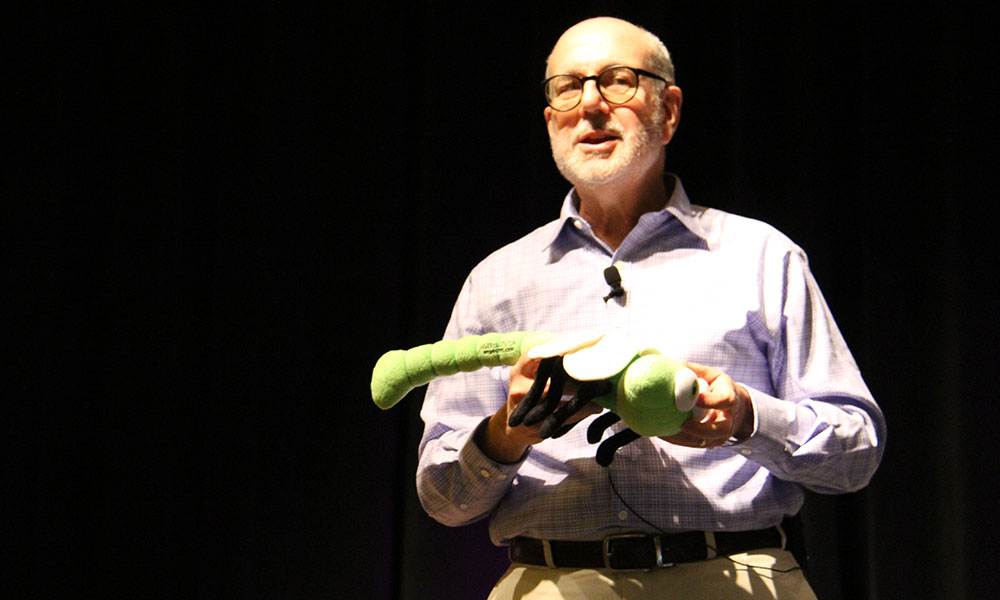
Alan Gregerman’s Really Great Idea: Strangers Can Inspire Your Thinking
The author of the new book The Necessity of Strangers told audience members at the Opening General Session of the 2015 ASAE Great Ideas Conference that they might have better luck finding an inspiring idea by eyeing sources of inspiration outside of their comfort zones.
Looking to get inspired about a pressing issue? Talk to someone you don’t know.
In fact, it might be the difference between failing and reaching your goals, because they have experiences that don’t match yours.
That’s the message Alan Gregerman, president and chief innovation officer of Venture Works—as well as author of The Necessity of Strangers—brought to ASAE’s 2015 Great Ideas Conference in Orlando.
http://twitter.com/erinmfuller/status/574626037159477248
(He also brought a number of props—including a pair of swimming goggles, an IKEA bag, and a portable tape player he amusingly called a “Walkperson.”)
Gregerman’s main point: Too often, we spend time trying to reinvent the wheel while relying on a limited worldview—when the best ideas and lessons we could add to our organization’s business models might come from people we’ve never met and industries we’ve never considered could have something in common with our own.
“It turns out that the people we know super well are an awful lot like us,” Gregerman said.
Gregerman talks freestyle swimming with the help of some goggles. (Sabrina A. Kidwai, APR, CAE)Throughout the session, he approached this basic point from numerous directions:
A fundamental toy changed the trajectory of aviation history @alan_gregerman #ideas15 pic.twitter.com/4nML47LWnl
— Willis Turner🌿 Entrepreneur 🇨🇦 (@willisturner) March 8, 2015
Gregerman noted that the inventor of the modern helicopter, Igor Sikorsky, didn’t come to the idea from a bubble. Rather, he was inspired by 2,000 years of attempts at innovation that came before—particularly by a toy he played with when he was a child in Russia, the Chinese top, which flew straight in the air when rapidly rubbed between two hands. “That experience was so compelling to Sikorsky that he imagined that someday someone might move their hands, but in a more compelling and more powerful way, and launch humans straight up from the ground,” Gregerman said.
He suggested that the U.S. Census Bureau missed an opportunity to take its once-a-decade survey digital—throwing out a multimillion-dollar prototype and switching to a much more expensive pen-and-paper approach—because it had missed obvious parallels from other industries. He noted that UPS had effectively solved the problem the Census Bureau was facing more than 15 years earlier, but government employees had never thought to discuss it with the UPS drivers who visited the agency daily.
He highlighted how a recent effort to create autonomous vehicle systems—a.k.a. self-driving cars—was inspired by the way fish communicate with one another. “They’re constantly pinging each other to tell each other which direction to go and how fast to do it,” Gregerman said. The researcher who figured this out ended up talking to marine biologists to get the missing piece of the puzzle—which was obvious to them, but nobody else.
He described how two Rice University students found a way to test blood in Third World countries on the cheap, without electricity. The blood centrifuge solution they found came from an unlikely place—Bed, Bath, and Beyond. By using a salad spinner for 10 minutes, they were able to separate blood into individual parts, making it easy to test for anemia—often considered an indicator of other diseases, like malaria and HIV.
He recalled how he once interviewed for a consulting gig with a struggling bank whose leaders expressed surprise that he didn’t have a business degree. (Gregerman’s business acumen comes from an unusual place—he has a degree in geography.) When pressed on the issue, he flipped the point on them: “All of you went to business school, and your company’s last in customer service—that’s awesome, don’t you think?” While blunt, the approach won him the gig.
Ultimately, these anecdotes underscored a simple point: It’s important to look outside your circle to find inspiration.
“I would suggest that it’s not who we know that matters, but who we could know that matters—who we know that knows something that’s a missing piece to a puzzle that we’re trying to solve,” Gregerman said.
He left that thought with the more than 800 attendees at the Hyatt Regency in Orlando—a place full of the potential to learn new things.
“I challenge you for the next two days and beyond to be way more curious than you give yourselves credit for,” he said.
"The Necessity of Strangers" author Alan Gregerman (Sabrina A. Kidwai, APR, CAE)






Comments